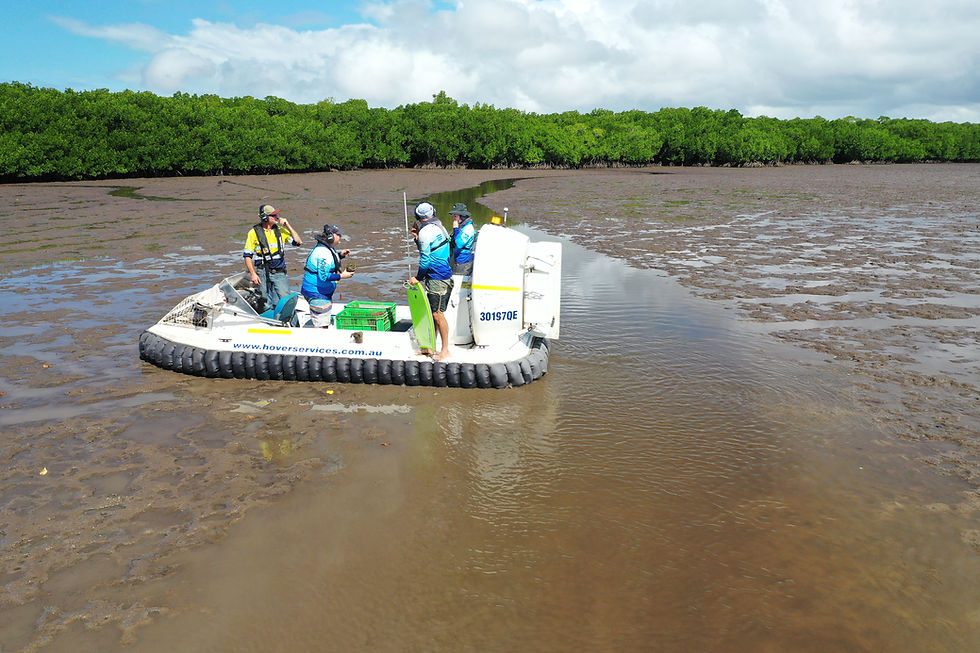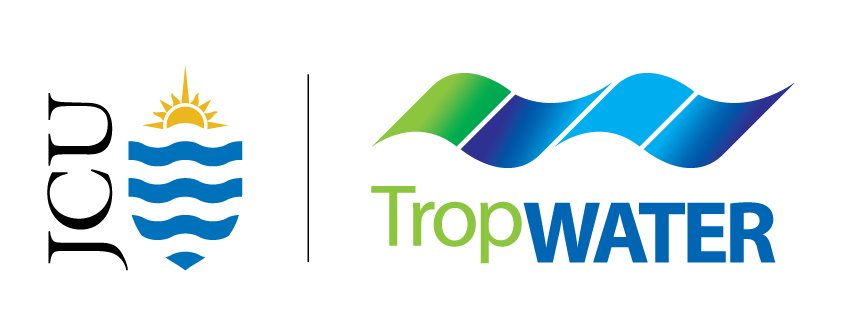Seagrass habitats
Seagrasses are powerful carbon sinks, vital food sources for dugongs and green turtles and serve as essential nurseries for prawns and fish.
We house Australia's largest seagrass research group and have more than 40 years of experience in seagrass research. We monitor, map, restore and research inshore seagrass meadows, collaborating with Traditional Owners, industries, and governments.
We are partnering with Indigenous Rangers across northern Australia to co-design seagrass monitoring programs, conduct baseline surveys, and build capacity in key skills for ongoing Ranger-led monitoring.
Establishing Ranger-led seagrass monitoring programs

Community, Monitoring
We surveyed over 250 km of coastline with First Nations partners to assess the impact of flooding caused by Tropical Cyclone Jasper, one year after the flood event.
Assessing the impacts of flooding after Tropical Cyclone Jasper

Monitoring
We are working with Traditional Owners to deploy temperature loggers to measure thermal risk to inshore seagrass, and developing a model to predict areas of seagrass most at risk of thermal stress from high temperatures.
Thermal risk for inshore seagrass on the Great Barrier Reef
%20Photo%20by%20Cat%20Collier.jpeg)
Monitoring, Community
We're working with Gunggandji-Mandingalbay Yidinji Rangers in a long-term partnership to map and monitor benthic habitats and the megafauna, and provide the tools and training to support Rangers in managing their Sea Country.
Building capacity of Gunggandji-Mandingalbay Yidinji Rangers
.jpg)
Community, Monitoring
Our rapid visual surveys mapped 3,500 km² of benthic fauna and seagrass in five reef lagoons of the Coral Sea Marine Park, leading to further research on potential fish nurseries in deepwater marine vegetation areas.
Reef lagoon benthic habitat mapping in the Coral Sea Marine Park

Monitoring, Research
The project embraces the combined benefits of Indigenous Knowledge, on-ground monitoring, and science and management expertise to provide training for Torres Strait rangers and to report data needed for ecosystem management.
Torres Strait seagrass mapping, monitoring and research

Monitoring, Community
We monitor and assess the condition of inshore seagrass meadows across the Great Barrier Reef, providing long-term data essential for managing these habitats.
Monitoring seagrass health in the Great Barrier Reef

Monitoring
Following back-to-back floods, scientists undertook surveys to understand seagrass loss and its impact on dugong and turtles.
Post-flood monitoring of seagrass in Hervey Bay and Great Sandy Strait

Monitoring
Over four years, we will plant thousands of seagrass fragments and over half a million seeds, while tracking the return of fish species and measuring the blue carbon benefits.
Restoring tropical seagrasses and their ecosystem services

Restoration
Projects

Abbi Scott
Senior Research Officer

Alejandro Navarro
Research Officer

Alex Carter
Principal Research Officer

Caitlin Smith
Research Officer

Carissa Reason
Research Officer

Catherine Collier
Principal Research Officer

Chris van de Wetering
Research Worker

Darcy Philpott
Research Worker

Embla Settli
Research worker

Evie Furness
PhD student

Hayley Brien
Research Worker

Jaelen Myers
Research Officer

Jane Mellors
Casual Senior Research Officer

Katie Chartrand
Senior Research Fellow

Kirsty Whitman
Research Worker

Laura Garcia Forte Valiente
Research Officer

Len McKenzie
Principal Research Officer

Lloyd Shepherd
Research Worker

Lucas Langlois
Research Officer
_edited.jpg)
Luke Hoffmann
Research Worker

Megan Proctor
Research Worker

Michael Rasheed
Principal Research Scientist

Nicki Wilson
Research Worker

Paul Leeson
Technical Officer

Paul York
Senior Research Officer

Rob Coles
Principal Research Scientist

Samantha Tol
Senior Research Officer

Skye McKenna
Senior Research Officer

Sofi Forsman
Master's student

Tessa Concannon
Research Worker

Tim Smith
Senior Research Officer


